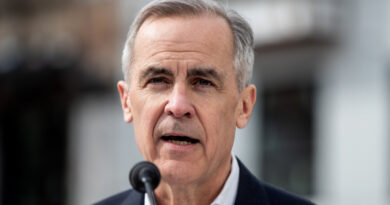Oshawa GM Plant Unveils Shift Reductions in Response to U.S. Tariffs
General Motors has announced a shift reduction at its Oshawa Assembly Plant due to the auto tariffs implemented by the United States.
Starting this fall, the plant will transition from a three-shift to a two-shift operation, “in light of forecasted demand and the evolving trade environment,” according to GM Canada in a statement released on May 2.
The company indicated that these adjustments would promote a more sustainable manufacturing presence as GM pivots the Oshawa plant to produce more trucks for Canadian consumers.
“GM must reverse this short-sighted decision before further damage occurs,” said Unifor National President Lana Payne.
Payne criticized the decision as “premature and disrespectful,” highlighting that U.S. President Donald Trump and Prime Minister Mark Carney had yet to hold discussions regarding tariffs. The two leaders are scheduled to meet on May 6 at the White House.
Trump imposed a 25% tariff on Canadian vehicles on April 3, which included an exemption for American-made car parts compliant with the United States-Mexico-Canada Agreement, with Carney subsequently announcing reciprocal tariffs of the same rate. Although the White House planned to unveil additional tariffs on auto parts this weekend, the U.S. Customs and Border Protection provided guidance on May 1 indicating that parts adhering to the trade agreement would be exempt.
Reactions
Prime Minister Mark Carney expressed during a press conference on the same day that the news was a “terrible manifestation” of the trade dispute between Canada and the U.S.
“I want to extend my heartfelt sympathy to [workers] and their families. This is an incredibly challenging time,” he remarked.
Carney reaffirmed his previous commitment to aid industries affected by tariffs and indicated that revenue from Canada’s reciprocal tariffs on the U.S. would be utilized to support workers. He also stated that companies must continue to prioritize employment and investment in Canada; otherwise, there would be consequences for those businesses.
Industry Minister Anita Anand conveyed in a statement her “profound disappointment” regarding the impending layoffs at the GM plant and noted that she seeks clarity from GM Canada’s president on the matter.
On April 15, Ottawa declared it would assist automakers by permitting them to import a specific number of U.S.-assembled vehicles into Canada without tariffs. However, this relief for Canadian automakers is contingent on their ongoing vehicle production and adherence to planned investments.
“The number of tariff-free vehicles allowed for import will decrease if there are reductions in Canadian production or investments,” the government stated.
Ontario Premier Doug Ford expressed his concerns about the GM plant’s reduced production, stating it was “extremely difficult for the workers in Oshawa and their families.”





